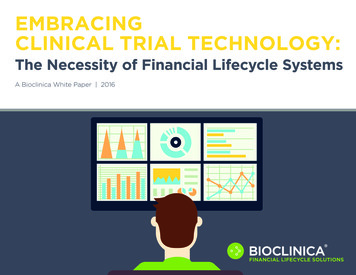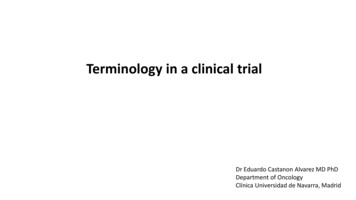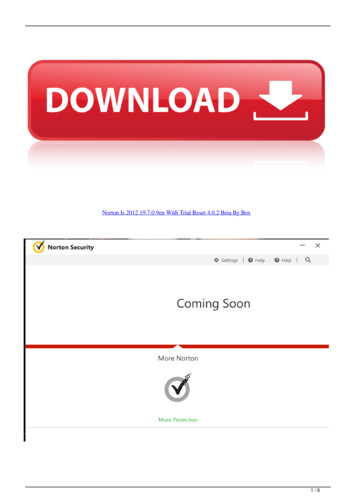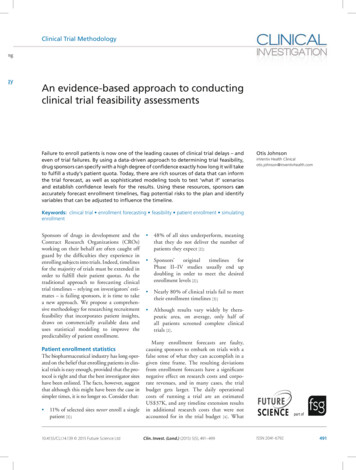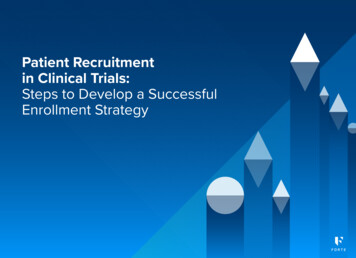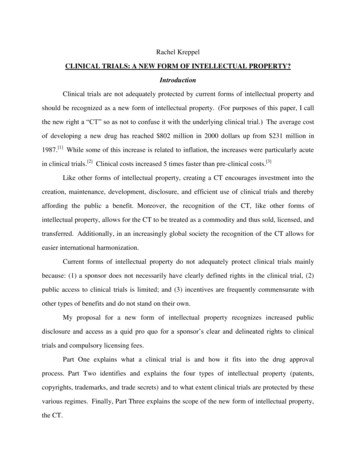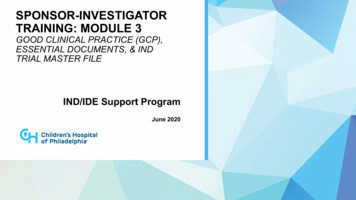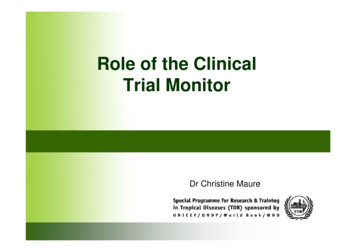
Transcription
Role of the ClinicalTrial MonitorDr Christine Maure
Monitoring The act of overseeing the progress of a clinical trial,and of ensuring that it is:conducted,recorded,and reportedin accordance with the protocol,Standard Operating Procedures (SOPs),Good Clinical Practice (GCP),and the applicable regulatory requirement(s).Trial monitoring is an Integral Component of trial quality assuranceprocess, and critical for GCP fulfilment
Role of the Clinical monitorProtocol, GCP, SOP’s, RegulationsSpons orInvestigatorSite and teamProgress, compliance, problems, data
The Purpose The purposes of trial monitoring are to verifythat:(a) The rights and well-being of human subjects areprotected.(b) The reported trial data are accurate, complete,and verifiable from source documents.(c) The conduct of the trial is in compliance with thecurrently approved protocol/amendment(s), with GCP,and with the applicable regulatory requirement(s).
PremiseInvestigator and his team: EducationTraining Experience Good for medical carebutinadequate for GCPclinical trial
Selection and Qualifications of Monitors(a) Monitors are appointed by the sponsor.(b) Monitors must be appropriately trained,and should have the scientific and/or clinicalknowledge needed to monitor the specifictrial adequately.Monitor’s qualifications should bedocumented.
Extent and Nature of Monitoring The sponsor should ensure that the trials areadequately monitored. The sponsor should determinethe appropriate extent and nature of monitoringcommensurate with the level of technical detailinvolved.the e size, andendpoints of the trial.
Tasks - Mandate The monitor(s) shouldensure that the trialis conducted anddocumented properly Acting as the main line ofcommunication between the sponsor andthe investigator.
MONITORING VISITSPre - Trial Monitoring visit :Ensure feasibility in the centre and interest of the investigator.Trial Initiation visit :Deliver study material, documents, products and make surethe investigational team understands the protocol and GCP requirements.Routine Monitoring visit :Make sure the study is conducted according to the protocoland GCP and help the investigational team in solving problems.Close-out visit :Make sure the investigator file is archived properly and collect back all unusedmaterial, documents or products.9
Tasks -Resources Verifying1 that the investigator hasadequate qualifications andresources and remainadequate throughout the trialperiod,2 that facilities, includinglaboratories, equipment, andstaff, are adequate to safelyand properly conduct the trialand remain adequatethroughout the trial period.
Tasks -Laboratory VerifyRelevant SOPQC/QA process - Facility, reagents, equipment, results etcAppropriate specimen storageFunctionality of equipmentTracking subject-specimen-result-CRF
Tasks - Supplies Ensuring that the investigator receives thecurrent Investigator's Brochure, alldocuments, and all trial supplies needed toconduct the trial properly and to comply withthe applicable regulatory requirement's.shipment process, temperature maintenance, storageof product/reagents, disposal mechanism etc
Tasks – Investigational product(i) That storage times and conditions areacceptable, and that supplies are sufficientthroughout the trial.(ii) That the investigational product(s)are supplied only to subjects who are eligibleto receive it and at the protocol specified dose(s).(iii) That subjects are provided with necessaryinstruction on properly using, handling, storing,and returning the investigational product(s).( (iv) That the receipt, use, and return of the investigational product(s) atthe trial sites are controlled and documented adequately.(v) That the disposition of unused investigational product(s) at the trialsites complies with applicable regulatory requirement(s) and is inaccordance with the sponsor.
Tasks –Compliance & progress Verifyingthat the investigator and the investigator's trial staffare performing the specified trial functions, in writtenaccordance with the protocol and any otheragreement between the sponsor and the investigator/ institution, and have not delegated these functions tounauthorized individuals.that the investigator is enrolling only eligiblesubjects.that written informed consent was obtained beforeeach subject's participation in the trialVerifying that source documents* and other trialrecords are accurate, complete, kept up-to-date andmaintained.
Tasks -CRF Verify that CRF’s are:Correct and accurately completedConsistent with corresponding SD whereseparateOnly authorized persons completeCorrections made are signed, dated & backedby accurate SDDRQ’s accurately documentedStorage and/or shipment is secured
Source Data Verification Original documents, data, and records e.g., hospital records,clinical and office charts,laboratory notes,memoranda,subjects' diaries or evaluation checklists,pharmacy dispensing records,recorded data from automated instruments,Copies or transcriptions certified after verification as beingaccurate photographic negatives,microfilm or magnetic media, x-rays,subject files,and records kept at the pharmacy, at the laboratories andat medico-technical departments involved in the clinical trial.
Tasks - ReportingReporting the subject recruitment rateTrial progressProblems at siteNeeds at siteSolicit solutions
FrameworkDSMBSponsorClinical MonitoreeittmmoCcsihtEInvestigator
Monitoring The act of overseeing the progress of a clinical trial, and of ensuring that it is: conducted, recorded, and reported in accordance with the protocol, Standard Operating Procedures (SOPs), Good Clinical Practice (GCP), and the applicable regulatory requirement(s). Trial monitoring is an Integral Component of trial quality assurance


